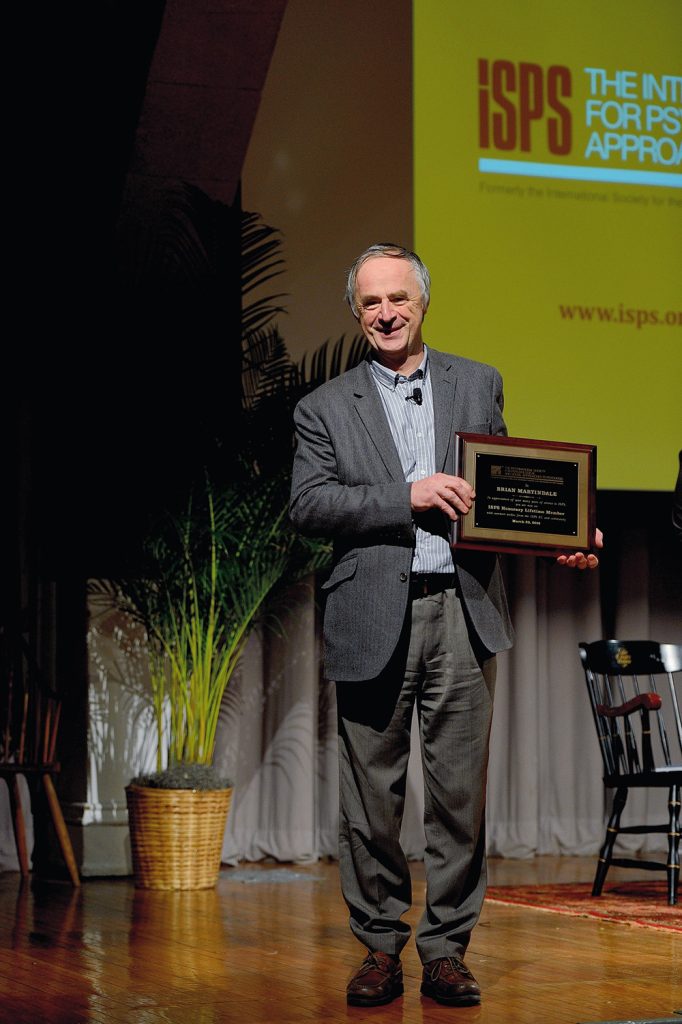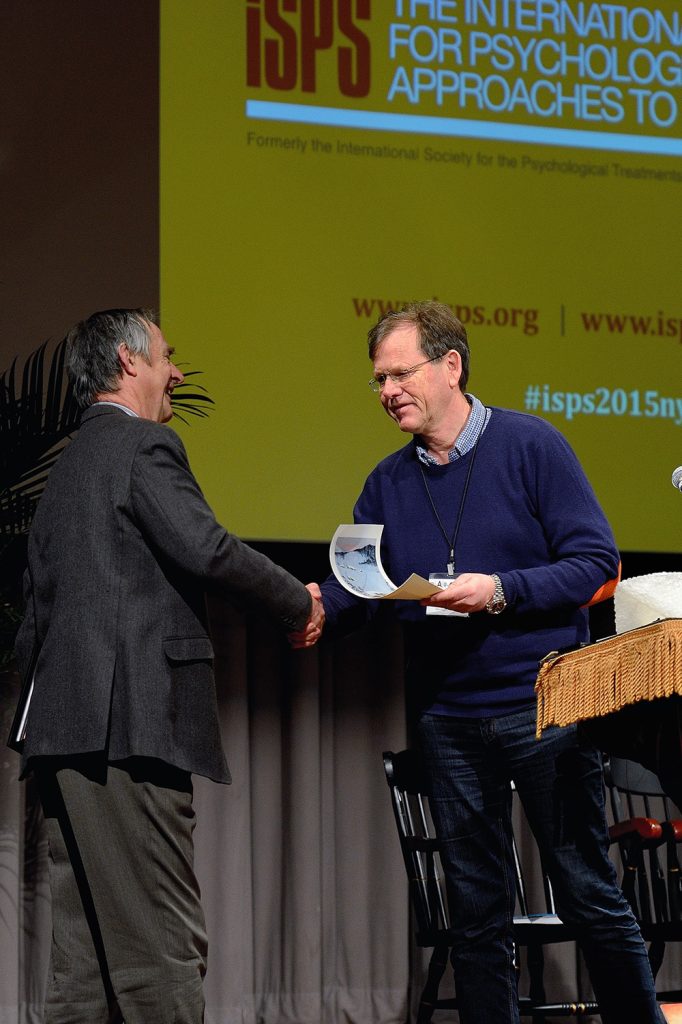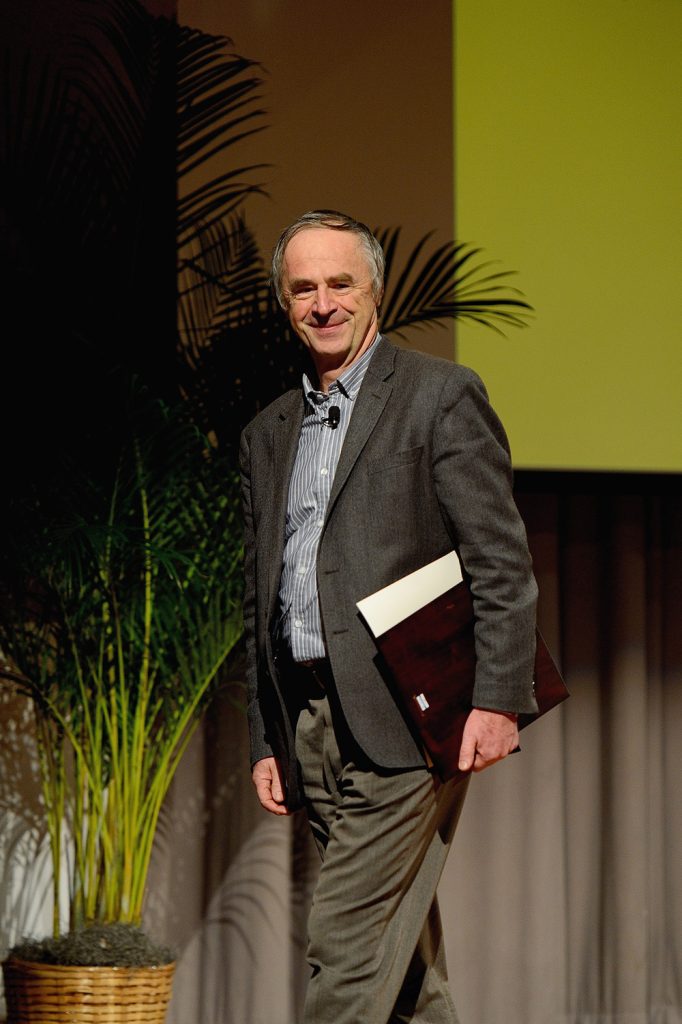Brian Martindale
May 4, 2023 2023-05-04 12:59It would not be an exaggeration to describe Brian Martindale as the leading organizational guru in the international world of psychotherapy. He combines a remarkable breadth of social vision with unflagging enthusiasm and a rare capacity to express complex ideas in straight forward language. His major achievements include the founding of the European Federation for Psychoanalytic Psychotherapy in the Public Sector; developing ISPS from an organization that restricted itself to an international conference every three years to one supporting local and regional groups in 21 countries; organizing the first international ISPS conference in the UK and founding and acting as first chair of the UK Network of ISPS; representing Western Europe in the World Psychiatric Association and taking the lead in writing the WPA guidelines for psychiatrists in early intervention in psychosis; and initiating and acting as first editor of the ISPS book series, now with 18 volumes to its credit.
Although he did well as a medical student in psychiatry, Brian did not consider becoming a psychiatrist for some years after qualifying despite spending a year as a Fellow in Neurology at Johns Hopkins in Baltimore in the USA. It was in his late 20’s, doing a psychiatry placement at Knowle Hospital, a large mental hospital in England, while studying for higher exams in internal medicine that he realised and declared his interest. He had to stand up to one of his mentors who asked why did he not want to be a ‘proper doctor’.
Brian comments that just as there remains a serious stigma to having mental health difficulties, so there was and still can be a stigma attached to being a psychiatrist. At the time he was being helped to make sense of himself in personal therapy and his parallel professional interest in understanding people has never since taken a back seat.
He trained as a psychiatrist at the Maudsley Hospital, pursuing his interest in individual, group and family psychotherapies, going on to higher training at the Cassel Hospital, the psychoanalytically informed therapeutic community developed by the renowned psychoanalyst Dr Tom Main, who coined the term ‘therapeutic community’. Here Brian went through a professional crisis and wanted to leave, missing the predictable structure of outpatient psychotherapy. Seriously troubled patients were causing all kinds of community strains and disruptions, and the need to keep having meetings with the other staff seemed initially a ‘nuisance’.
He came out of the crisis with the ‘simple’ emotional realisation – similar to the one Tom Main had at Northfield Hospital during WW2 – that how well the staff worked together was crucial to the functioning of the community. From then on he was no longer ambivalent about ‘organisational’ work and realised it involved the same issues as working with patients, but that this work required its own structure that was relevant to the tasks of understanding and holding the institution or community and trying to sort things out.
On completing his training as a psychoanalyst Brian became what was called then a specialist Consultant Psychiatrist in Psychotherapy in West London, and became involved with the Association of Psychoanalytic Psychotherapy in the British National Health Service. At that time he had little experience of psychotherapy in relation to psychosis and his clinic tended to exclude such persons from consideration. He became the chair of APP conferences and put on a European Conference in response to the increasing freedom of movement of professionals within the European Union. This turned out to be another turning point in his professional life. The conference attracted leading Europeans in the field and the splendid British isolation and arrogance was tempered by hearing of developments far superior to those in the UK in (inter alia) Germany, Netherlands, Sweden and Finland. Brian’s personal contact with fellow ISPS Honorary Life Member Johan Cullberg of Sweden started at this point as well as with Kari Pyllkänen, the brilliant Finnish psychoanalyst organiser who had seen through the legal framework for provision of psychotherapy in Finland.
The success of the conference led to the realisation of the need for a European organisation for psychoanalytic psychotherapy that focussed especially on public services. Brian wanted to create an organisational structure that would facilitate the application of psychoanalytic understanding to the problems of the wider population, but was keen to avoid stepping on the toes of psychoanalytic organisations which operated outside the public sector and had a different primary task. Among the building blocks needed there were two he regarded as crucial to organisational success.
The first was to try and reduce the tendency of psychoanalytic organisations to use up enormous amounts of their energy with internal boundary issues. He arranged for there to be three clear sections with equal say in the organisation – individual adult psychoanalytic psychotherapy, child and adolescent psychoanalytic psychotherapy and group psychoanalytic psychotherapy. (He is very pleased that a fourth section has been added for family and couple psychoanalytic psychotherapy). The second requirement was for membership to be via national networks and not local networks or for there to be an undertaking to form national networks. This was because national influence and policies could only come about if there was a national body. This structure forced multiple organisations within a country into relationship with one another.
Once the basic structure was clear he was greatly helped by members in the UK and by the slow building up of relationships with colleagues throughout Europe, and in 1991 the European Federation for Psychoanalytic Psychotherapy in the Public Sector was launched. Brian was the first chair and was subsequently made Honorary President, and is justly proud of facilitating the development of this organisation which now involves some 30 European countries and has a network of perhaps 15,000 or more therapists, with its regular conferences, local influences, newsletters and book series (see www.efpp.org).
Another transformational experience in 1991 was being invited by Johan Cullberg to the ISPS conference in Stockholm and hearing so many accounts of the application of psychoanalytic and other modalities of psychotherapy to people who had psychotic experiences, something relatively rare in the UK at that time and often regarded as either contraindicated or ineffective. At that time the ISPS as an organisation did little more than ensure the important international conferences took place every three years. At the 1994 conference in Washington Brian ensured there was a considerable UK contingent who would be central to the planning of an ISPS conference in London in 1997 and they were given the green light.
As well as organising the conference, Brian worked closely with the former Presidents of ISPS (i.e. those who had led the international conferences) to transform ISPS into a more substantive organisation. His experience of designing the EFPP had been invaluable in creating a structure suitable for the task. The structure needed was however very different from the EFPP. The aim was to create a structure that supported local or regional groups in whatever format best suited the network, thus encouraging the organising of local activities. ISPS was to be multimodality and membership required no qualification beyond being interested in promoting psychological therapies for psychosis.
1997 was the transformation moment for ISPS when members approved a constitution for the first time, with far reaching objectives and new organisational structures at international level that supported the objectives and the development of local groups for the first time. The President or Chair had always been the Chair of the previous international organising committee. Brian refused this and from then on the chair was elected as the best person for the task and likewise the committee was from now an elected one.
The 1997 conference was also very important for the UK. It was very well attended with some 800 participants and those from the UK were exposed to experts from around the world. Brian was determined that the UK would benefit and with the support of the Royal College of Psychiatrists published a book on Psychosis: Psychological Approaches and their Effectiveness which sold very well. Subsequently Brian worked with colleagues from the conference to form the UK network of ISPS and was privileged to be its first chair where he helped to organise a good number of national residential and day conferences which begin to make an impact.
There were two further outcomes from the EFPP and ISPS developments. With his organisational expertise he was put forward by the Royal College of Psychiatrists to represent psychiatry for the Western European Zone of the World Psychiatric Association and was well enough known in Europe to be subsequently elected by European colleagues. There were many challenges to this role and he witnessed the distasteful powerful influence of the pharmaceutical industry in many ways. Amongst other activities he organised some unique meetings in which representatives from throughout Europe could start to reflect on the identity crisis of psychiatry. For his work with the WPA he was made an Honorary Member.
From a clinical perspective, his experience of ISPS and exposure to the work of many inspiring colleagues led him to see more and more people with psychosis, working with them in individual, long term group and later family settings. The development of early intervention in psychosis teams in the UK inspired him to make a career move completing his professional transformation. From being someone who tended to exclude people with psychosis from his NHS practice, he was appointed in 2005 to be the consultant psychiatrist to an early intervention team where he was only working with people who experienced psychosis and moved with his family to the north-east of England. After a few years his team was short listed for the UK Psychiatric Team of the Year. Although he found this work very interesting and rewarding, he also encountered and sometimes suffered from how threatening it can be for many working in the mental health field to be more engaged with understanding people with psychosis from a human perspective. He is aware that the converse is also true, that some with an exclusive psychological perspective can be threatened by a pharmacological perspective. He believes the ISPS needs to keep walking this tightrope, looking with an open minded attitude in all directions.
Brian continued on the Education Committee of the WPA and used his ISPS contacts to take the lead in writing the WPA guidelines for psychiatrists in early intervention in psychosis, guidelines which have been distributed world-wide and translated into other languages. He regards this as an important role of ISPS, to use its members to influence other organisations. In this respect he was very pleased to have introduced the work of ISPS Honorary Life Member Yrjö Alanen into the WPA and for him to be given the WPA Philippe Pinel Prize, Psychiatry for the Person, Articulating Medicine’s Science and Humanism.
Apart from one brief spell, Brian has been involved at executive level with ISPS from 1991 until the 2015 conference in New York and was the Chair for the last five of these years. He is pleased to see that the structure he devised with colleagues has been good enough to support their original aims and considers it a privilege to have been active in promoting local networks, which now number 21 with more than 1500 members. Many of the networks are very active and creative. He is also very proud to have been the initiator and first editor of the ISPS books series which now extends to 18 volumes.
Brian feels privileged to have worked alongside inspiring colleagues in the UK and his fellow leaders and friends in Scandinavia, Johan Cullberg, Yrjö Alanen, Jan Olav Johannessen and Bent Rosenbaum as well as the talented John Read for his great skill in developing the ISPS journal Psychosis. During his chairmanship of ISPS he has attempted to consolidate the organisation and lay the ground for a new phase of development. This will involve the ISPS becoming more effective by working in collaboration in key areas with sibling organisations, and by reaching out to involve nurses more as they are often best placed, from their great numbers and close contact with people with problems related to psychosis, to utilise psychological understanding and approaches.
In 2012 Brian retired from his full time NHS job and started to develop a part time private practice whilst chairing the ISPS. He is also on the board of the British Psychoanalytic Society where he contributes to the work of changing the organisation to meet current circumstances. He hopes to be fit enough and look after his time well enough that he can continue to play tennis and squash regularly and to walk in the hills, read well outside his professional field as well as enjoy the continuing development of his family.
In conclusion, Brian has always realised the importance of generativity in his organisational work – the importance of making sure the organisation is ‘organised’ for its future development, continuity and change of personnel. He is very pleased to have left behind excellent successors and to be able to enjoy from an appropriate distance their successes and the further development of the organisations he has worked for.
David Kennard




